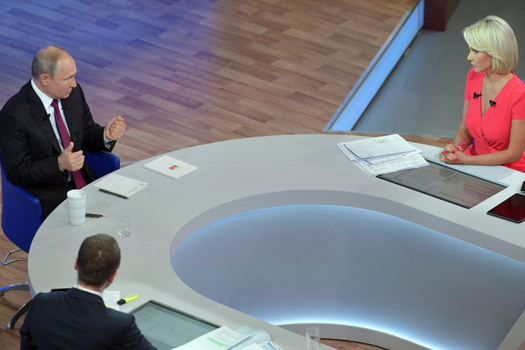
Putin says he’s against relaxing Russia’s drug laws
Мы говорим как есть не только про политику. Скачайте приложение.
During his annual televised call-in show on June 20, Vladimir Putin said he opposes an initiative to relax Russia’s criminal laws against illegal narcotics. At the same time, the president stressed the need to strengthen control over the actions of police in this area, to avoid more “cases like with the journalist,” referring to the recent arrest of Meduza special correspondent Ivan Golunov.
TV host: Returning to Criminal Code Article 228 about illegal drugs: a lot of people have been convicted in this country. And most say the police planted the drugs on them, when they try to prove it. Maybe it’s time to amend the part of the Criminal Code that lays out the penalties for possession?
Putin: It’s true that we have a lot of convictions for violations in the sphere of drug trafficking. Moreover roughly 26 percent of the entire prison population is there for crimes related to illicit trafficking in narcotics and other controlled substances. Do we need to relax the laws in this sphere of activity? In my view, no, because the threat to the country, the nation, and our people is very great. And that’s why, if someone illegally stores, transports, or distributes even small volumes and doses, they must be held responsible. There can be no relaxing of the laws here.
It’s another matter that we need to establish control over the actions of law-enforcement agencies, to prevent any wrongdoing on their part, so people don’t end up behind bars for the sake of check marks and crime statistics. So there are no cases, like with the journalist you mentioned. By the way, the police generals were fired for that. I hope the necessary investigative steps will be taken to identify…
TV host (interrupting the president): Ivan Golunov.
Putin: … to identify everyone responsible for creating this abnormal situation. I repeat: the most important thing here is to establish control. I will speak again to the Attorney General’s Office, the FSB, and the Interior Ministry. Maybe we need to create a separate office in the Interior Ministry’s security system that would control this sphere of activity. And it wouldn’t hurt the FSB to monitor this more closely.
(1) The Golunov case
In early June, Ivan Golunov was arrested in Moscow on false charges of dealing drugs. Golunov suspects the case against him could be related to his reporting on Russia’s funeral business. After a public campaign, the Interior Ministry freed Golunov and closed the case against him.
(2) Article 228
Russia’s Criminal Code statute against the illegal purchase, storage, transportation, manufacturing, and processing of controlled substances. The maximum penalty under Article 228 is 15 years in prison. Under Article 228.1, which applies to the illegal sale of narcotics, the maximum penalty jumps to 20 years in prison.